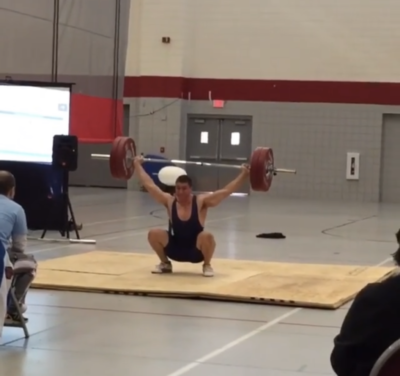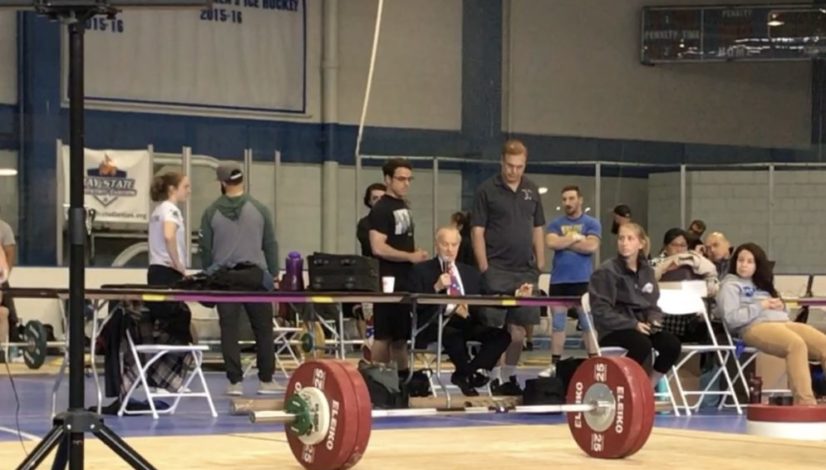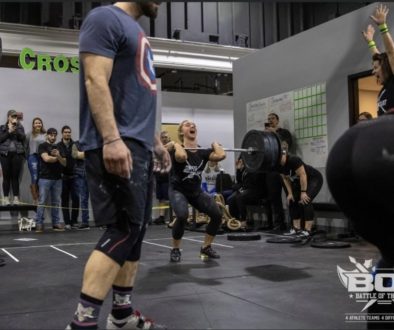5 Things I Wish Someone Told Me Before My First Weightlifting Meet
Rewind to April of 2010. It was an unusually hot and humid afternoon in the Sacred Heart University gymnasium, and I was immersed in a completely foreign situation. My name was called over the PA system and the clock began its sixty-second countdown. It was time for my opening snatch attempt.
As I was about to step onto the competition platform for the very first time, I was completely unaware of the twelve year (and counting) journey I was about to embark upon into the engrossing sport of weightlifting.
Reflecting back on that moment, it really does make me realize that twelve years can go by in what feels like the blink of an eye. Despite the passage of over a decade, my passion for weightlifting has not faded, and I have used the many experiences gained and lessons learned to help share that passion and knowledge with those whom I coach.
Maybe June of 2022 (or whenever you may be reading this) is about to be your first venture onto the competition platform. My goal for this article is to offer up some reflections from my first meet that might, in turn, help you feel better prepared for your first competitive experience.
Without further ado, here are five things that I wish someone told me before my first weightlifting meet.
First-Timer Tip #1: Get a Coach
I begin with this tip because, quite simply, if you follow it, then there will be little need for you to continue reading the tips to come. So, please, strongly consider getting a coach if you don’t have one already.
Though my very first meet back in 2010 was what I would consider to be a success, I often cannot help but wonder just how much better things would have gone in the early years if I had a coach.
Back in 2010, the weightlifting scene was a much different landscape than today. Even coming from the strength and conditioning world and knowing many great sports performance coaches, I didn’t know a single person who competed in weightlifting, let alone coached it.
In the United States today, however, the sport of weightlifting is thriving like never before. It is now not uncommon to find a weightlifting club (or several) in any major metropolitan area.
These clubs are filled with many first-time competitors just like yourself to share in the experience with, as well as many seasoned veterans who can show you the ropes.
If you do not currently know anyone in your area that coaches or competes in weightlifting, one of the best places to look is the the USA Weightlifting “Find a Club” database (https://www.teamusa.org/usa-weightlifting/club-wso/find-a-club).
This will allow you to view all the clubs in the surrounding radius so that you can choose the community and coaching team that is right for you.
In the event that, for some reason, you are unable to get a coach in time for your first meet please read on.
First-Timer Tip #2: Declare Openers in Kilos
Weightlifting is a sport tracked in kilograms. Thinking back, I am not quite sure how I missed this fact. I feel as though all the books and articles I would have been reading at the time must have somewhere mentioned this seemingly minor, though very significant, detail.
Regardless, there I was lined up at weigh-in, which occurs two hours before the scheduled start of competition, ready with my snatch and clean & jerk opening attempt declarations…in pounds of course (where is that eyeroll emoji when you need it).
Lucky for me, Joel, from the Sacred Heart coaching staff, bailed me out with some quick pound to kilo conversions. Thanks, Joel!
First-Timer Tip #3: Buy Yourself Some Extra Rest Time
Though I don’t remember it being a factor in my snatches, I sure do vividly recall that my lack of clock management know-how led to an exhausting series of clean and jerks.
In weightlifting, each lifter gets 60-seconds to make an attempt after his or her name is called. In the event an athlete has to repeat back-to-back attempts without the clock having started on someone else in between, a lifter will get a 2-minute clock. But, boy does two minutes fly by fast when trying to recover from competition clean and jerk attempts.
Any experienced weightlifter (which I clearly was not at the time of my first meet) will know that, for each attempt, you get to make a weight declaration and two changes, all of which will stop the clock momentary until the bar is properly loaded.
Had I understood the nuances of these rules more thoroughly, I would have been able to buy myself some extra time to rest between each clean and jerk. Good thing my cardio was a little better back in those days!
First-Timer Tip #4: Warm-up, Don’t Workout
I will admit, I cannot recall exactly what my first-meet warm-up consisted of in the back prior to setting foot on the competition platform, but I would put money on it being too long and too much (I have long had a masochistic nature to my training that I can’t seem to shake).
Your goal with the competition warm-up is to prime yourself for peak performance when you step out onto that stage, not to get a good sweat or pump going.
Having your warm-ups mapped out prior to the start of your session will leave you with one less thing to worry about. While a deep dive into counting attempts and planning out warm-ups is a topic for another day, plan to allot yourself approximately 20 attempts (or 20 minutes when counting one attempt equaling one minute) give or take a couple to get through all your warm-ups on the bar.
Also important to allot for is the 10-15 minutes of whatever general warm-up (mobility, activation, etc) you like to perform prior to hitting the barbell (and don’t forget to factor in the ten-minute clock that follows the athlete introductions at the start of your session).
Aside from the initial work with the empty bar and the first few warm-up sets, your warm-ups should be singles at a given weight performed at an interval of every 2-3 attempts on the competition platform.
Practicing this warm-up routine several times throughout your training in the weeks leading up to the meet is a surefire way to help set yourself up for success come game-time, so be sure to give it a test run or two prior to your meet.
First-Timer Tip #5: Don’t be Afraid to Ask for Help
Weightlifters are a passionate bunch, and let’s be real, no one gets into weightlifting to become filthy rich…so, you can rest assured that the coaches and competitors at a local weightlifting meet are there for the pure love of the sport.
If you are a newbie, do not hesitate to reach out to others at the meet for first-timer advice. If you have to attend the meet alone, most coaches at the local level would be more than happy to assist you through the warm-up process.
It is certainly important to realize that a coach’s athletes are going to be their priority at the meet, but if the person you happen to ask is unable to help, there is a high likelihood that he or she will be able to direct you to another coach or athlete that can. So please, speak up!
Time to Compete
If you made it this far, hopefully you are feeling more prepared than ever to set foot on that competition platform for the first time. If you already knew all the points made in the tips above, then congrats, you are steps ahead of many new lifters and should feel super confident heading into your meet.
Regardless of how much time you spend reading up on competition preparations, nothing can compare to what you’ll learn by jumping into the fire for the first time. So, buckle up and hold on tight, you are about to take a wild journey into the world of competitive weightlifting. Have fun and enjoy the ride.





